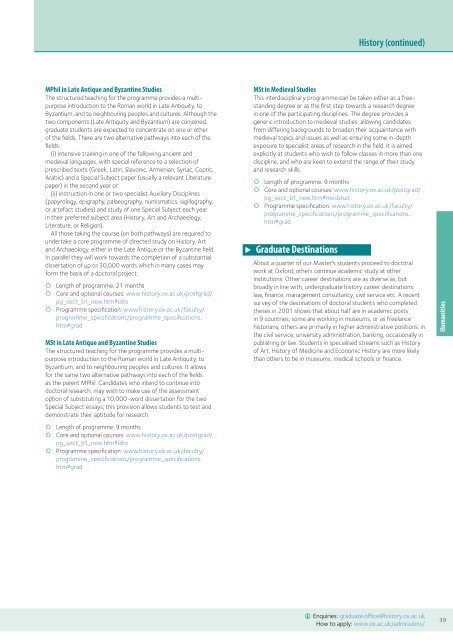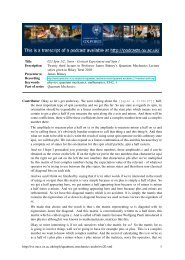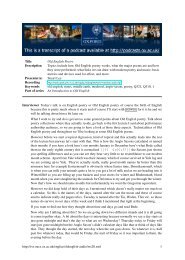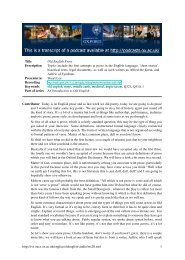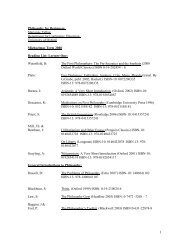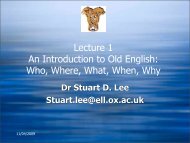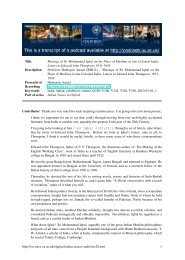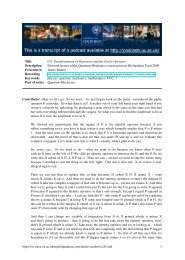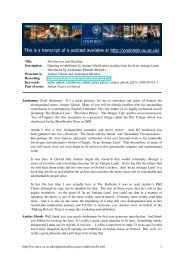History (continued)MPhil in Modern European HistoryInitial theoretical and methodological training similar to thatprovided for the MSt in History stream on post-1500 history <strong>of</strong>Britain and Europe is enhanced for this degree by a class on thewriting <strong>of</strong> history. In addition students expand their contextualknowledge and understanding by choosing from a menu <strong>of</strong>thematic options. Summer vacation and second MichaelmasTerm are set aside for individual research which will feed intowork towards the completion <strong>of</strong> a substantial dissertation <strong>of</strong>up to 30,000 words which in many cases may form the basis<strong>of</strong> a doctoral project. The writing-up <strong>of</strong> the dissertation duringthe second half <strong>of</strong> the second year is supported by a masterclass in which students have the opportunity to address widerhistoriographical, theoretical and methodological issues throughthe medium <strong>of</strong> their own research.|| Length <strong>of</strong> programme: 21 months| | Core and optional courses: www.history.ox.ac.uk/postgrad/pg_sect_b1_new.htm#m_meh2009| | Programme specification: www.history.ox.ac.uk/faculty/programme_specifications/programme_specifications.htm#gradMPhil in History <strong>of</strong> Science, Medicine, and TechnologyThis degree programme is designed to enhance history students’knowledge and understanding <strong>of</strong> the history <strong>of</strong> scienceand medicine, and to enhance the historical knowledge andunderstanding <strong>of</strong> students with mainly science backgrounds. Itshares many resources with its sister programmes in economicand social history. It provides in-depth training in the history <strong>of</strong>science and technology or the social history <strong>of</strong> medicine. Studentswill be examined in four papers, which may comprise either fourAdvanced Papers focusing on particular periods and topics, orthree Advanced Papers, and one paper in a related disciplineor skill (such as Comparative Social Policy). In parallel they willwork towards the completion <strong>of</strong> a substantial dissertation <strong>of</strong> upto 30,000 words which in many cases may form the basis <strong>of</strong> adoctoral project.|| Length <strong>of</strong> programme: 21 months| | Core and optional courses: www.history.ox.ac.uk/postgrad/pg_sect_b1_new.htm#m_hsm| | Programme specification: www.history.ox.ac.uk/faculty/programme_specifications/programme_specifications.htm#gradHumanitiesMPhil in Economic and Social HistoryThis degree programme is designed both to educate historiansin the methods <strong>of</strong> social science research, and to exposestudents with social science backgrounds to the challenges<strong>of</strong> historical enquiry. It <strong>of</strong>fers, in addition to economic andsocial history in the strict sense, a choice <strong>of</strong> papers coveringthe history <strong>of</strong> science and technology, the social history <strong>of</strong>medicine and historical demography. They will be examinedin four specialist papers, which may comprise either fourAdvanced Papers focusing on particular periods and topics,or two or three Advanced Papers, plus up to two papers in arelated discipline or skill (such as Economics or Sociology). Inparallel they will work towards the completion <strong>of</strong> a substantialdissertation <strong>of</strong> up to 30,000 words which in many cases mayform the basis <strong>of</strong> a doctoral project.|| Length <strong>of</strong> programme: 21 months| | Core and optional courses: www.history.ox.ac.uk/postgrad/pg_sect_b1_new.htm#m_esh| | Programme specification: www.history.ox.ac.uk/faculty/programme_specifications/programme_specifications.htm#gradMSc in Economic and Social HistoryThis degree programme is a slimmer version <strong>of</strong> the parent MPhil,and provides the usual entry route into research for candidateswho seek funding from the Economic and Social Research Council(ESRC) in the field <strong>of</strong> Economic and Social History. They areexamined on two specialist papers, either two Advanced Papersfocusing on particular periods and topics, or one Advanced Paperand one paper in a related discipline or skill (such as Economics orSociology). Candidates will also work towards a dissertation <strong>of</strong> upto 15,000 words which is to be submitted in September.|| Length <strong>of</strong> programme: 12 months| | Core and optional courses: www.history.ox.ac.uk/postgrad/pg_sect_b1_new.htm#m_esh| | Programme specification: www.history.ox.ac.uk/faculty/programme_specifications/programme_specifications.htm#gradMSc in History <strong>of</strong> Science, Medicine, and TechnologyThis degree programme is a slimmer version <strong>of</strong> the parent MPhil,and provides the usual entry route into research for candidateswho seek funding from the Economic and Social Research Council(ESRC) in the interdisciplinary field <strong>of</strong> Science, Technology andInnovation; candidates specialising in the history <strong>of</strong> medicine arealso eligible for Wellcome Trust funding. They are examined ontwo specialist papers, either two Advanced Papers focusing onparticular periods and topics, or one Advanced Paper and onepaper in a related discipline or skill (such as Comparative SocialPolicy). Candidates will also work towards a dissertation <strong>of</strong> up to15,000 words which is to be submitted in September.|| Length <strong>of</strong> programme: 12 months| | Core and optional courses: www.history.ox.ac.uk/postgrad/pg_sect_b1_new.htm#m_hsm| | Programme specification: www.history.ox.ac.uk/faculty/programme_specifications/programme_specifications.htm#gradMSt in History <strong>of</strong> Art and Visual CultureThis programme is run within the History Faculty by theDepartment <strong>of</strong> the History <strong>of</strong> Art, and aims to equip studentswith understanding <strong>of</strong> a range <strong>of</strong> methodologies in the history <strong>of</strong>art, while expanding their knowledge in specific areas. Combiningmethodological depth with access to magnificent primary sources,it welcomes students with a range <strong>of</strong> previous backgrounds inthe study <strong>of</strong> history, history <strong>of</strong> art and other disciplines. Over thefirst two terms, students take a course in the historiography andmethods <strong>of</strong> art history; in parallel, they choose a second coursefrom among a number <strong>of</strong> options for in-depth familiarisation witha specialist area. Throughout the year students will work towardsa dissertation project <strong>of</strong> up to 15,000 words which they will writeup and finalise in Trinity Term.|| Length <strong>of</strong> programme: 9 months| | Core and optional courses: www.history.ox.ac.uk/postgrad/pg_sect_b1_new.htm#m_havc| | Programme specification: www.history.ox.ac.uk/faculty/programme_specifications/programme_specifications.htm#grad38LLEnquiries:graduate.<strong>of</strong>fice@history.ox.ac.ukHow to apply: www.ox.ac.uk/admissions/
History (continued)MPhil in Late Antique and Byzantine <strong>Studies</strong>The structured teaching for the programme provides a multipurposeintroduction to the Roman world in Late Antiquity, toByzantium, and to neighbouring peoples and cultures. Although thetwo components (Late Antiquity and Byzantium) are conjoined,graduate students are expected to concentrate on one or other<strong>of</strong> the fields. There are two alternative pathways into each <strong>of</strong> thefields:(i) intensive training in one <strong>of</strong> the following ancient andmedieval languages, with special reference to a selection <strong>of</strong>prescribed texts (Greek, Latin, Slavonic, Armenian, Syriac, Coptic,Arabic) and a Special Subject paper (usually a relevant Literaturepaper) in the second year or:(ii) instruction in one or two specialist Auxiliary Disciplines(papyrology, epigraphy, palaeography, numismatics, sigillography,or artefact studies) and study <strong>of</strong> one Special Subject each yearin their preferred subject area (History, Art and Archaeology,Literature, or Religion).All those taking the course (on both pathways) are required toundertake a core programme <strong>of</strong> directed study on History, Artand Archaeology, either in the Late Antique or the Byzantine field.In parallel they will work towards the completion <strong>of</strong> a substantialdissertation <strong>of</strong> up to 30,000 words which in many cases mayform the basis <strong>of</strong> a doctoral project.|| Length <strong>of</strong> programme: 21 months| | Core and optional courses: www.history.ox.ac.uk/postgrad/pg_sect_b1_new.htm#labs| | Programme specification: www.history.ox.ac.uk/faculty/programme_specifications/programme_specifications.htm#gradMSt in Late Antique and Byzantine <strong>Studies</strong>The structured teaching for the programme provides a multipurposeintroduction to the Roman world in Late Antiquity, toByzantium, and to neighbouring peoples and cultures. It allowsfor the same two alternative pathways into each <strong>of</strong> the fieldsas the parent MPhil. Candidates who intend to continue intodoctoral research, may wish to make use <strong>of</strong> the assessmentoption <strong>of</strong> substituting a 10,000-word dissertation for the twoSpecial Subject essays; this provision allows students to test anddemonstrate their aptitude for research.|| Length <strong>of</strong> programme: 9 months| | Core and optional courses: www.history.ox.ac.uk/postgrad/pg_sect_b1_new.htm#labs| | Programme specification: www.history.ox.ac.uk/faculty/programme_specifications/programme_specifications.htm#gradMSt in Medieval <strong>Studies</strong>This interdisciplinary programme can be taken either as a freestandingdegree or as the first step towards a research degreein one <strong>of</strong> the participating disciplines. The degree provides ageneric introduction to medieval studies, allowing candidatesfrom differing backgrounds to broaden their acquaintance withmedieval topics and issues as well as ensuring some in-depthexposure to specialist areas <strong>of</strong> research in the field. It is aimedexplicitly at students who wish to follow classes in more than onediscipline, and who are keen to extend the range <strong>of</strong> their studyand research skills.|| Length <strong>of</strong> programme: 9 months| | Core and optional courses: www.history.ox.ac.uk/postgrad/pg_sect_b1_new.htm#medstud| | Programme specification: www.history.ox.ac.uk/faculty/programme_specifications/programme_specifications.htm#gradϐϐ<strong>Graduate</strong> DestinationsAbout a quarter <strong>of</strong> our Master’s students proceed to doctoralwork at <strong>Oxford</strong>; others continue academic study at otherinstitutions. Other career destinations are as diverse as, butbroadly in line with, undergraduate history career destinations:law, finance, management consultancy, civil service etc. A recentsurvey <strong>of</strong> the destinations <strong>of</strong> doctoral students who completedtheses in 2001 shows that about half are in academic postsin 9 countries; some are working in museums, or as freelancehistorians; others are primarily in higher administrative positions: inthe civil service, university administration, banking, occasionally inpublishing or law. Students in specialised streams such as History<strong>of</strong> Art, History <strong>of</strong> Medicine and Economic History are more likelythan others to be in museums, medical schools or finance.HumanitiesLLEnquiries:graduate.<strong>of</strong>fice@history.ox.ac.ukHow to apply: www.ox.ac.uk/admissions/39


